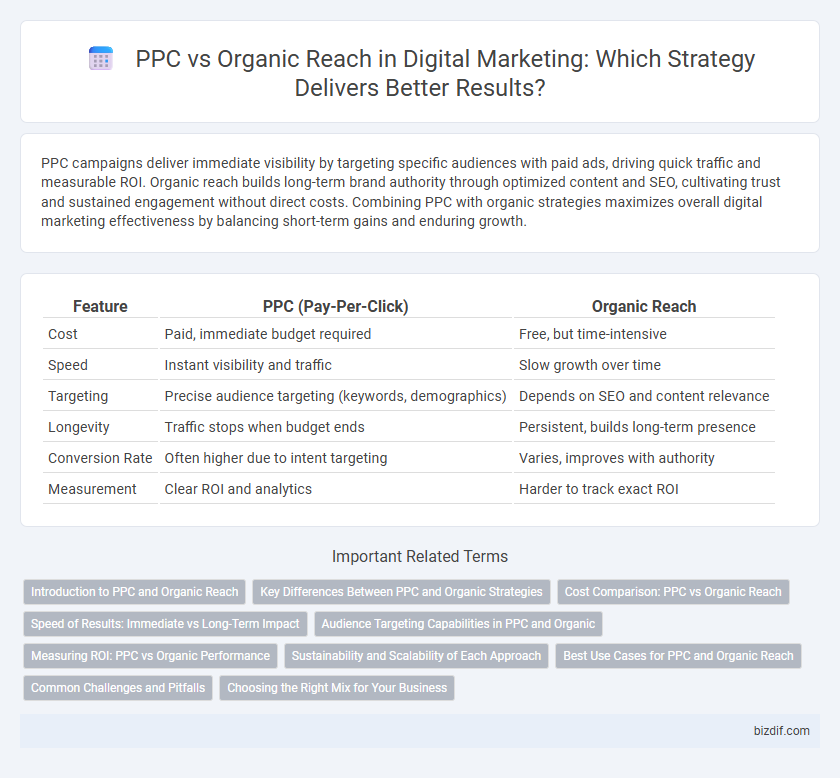PPC campaigns deliver immediate visibility by targeting specific audiences with paid ads, driving quick traffic and measurable ROI. Organic reach builds long-term brand authority through optimized content and SEO, cultivating trust and sustained engagement without direct costs. Combining PPC with organic strategies maximizes overall digital marketing effectiveness by balancing short-term gains and enduring growth.
Table of Comparison
| Feature | PPC (Pay-Per-Click) | Organic Reach |
|---|---|---|
| Cost | Paid, immediate budget required | Free, but time-intensive |
| Speed | Instant visibility and traffic | Slow growth over time |
| Targeting | Precise audience targeting (keywords, demographics) | Depends on SEO and content relevance |
| Longevity | Traffic stops when budget ends | Persistent, builds long-term presence |
| Conversion Rate | Often higher due to intent targeting | Varies, improves with authority |
| Measurement | Clear ROI and analytics | Harder to track exact ROI |
Introduction to PPC and Organic Reach
Pay-Per-Click (PPC) advertising offers immediate visibility by placing ads on search engines and social media platforms, allowing precise targeting based on keywords, demographics, and user behavior. Organic reach relies on content optimization, SEO strategies, and audience engagement to naturally increase visibility without direct costs per click. Combining PPC campaigns with strong organic reach efforts enhances overall digital marketing effectiveness and drives sustained traffic growth.
Key Differences Between PPC and Organic Strategies
PPC (Pay-Per-Click) delivers immediate visibility by targeting specific keywords through paid ads, ensuring quick traffic and measurable ROI, while organic strategies rely on SEO techniques to build sustainable, long-term search engine rankings without direct costs per click. PPC campaigns offer precise budget control and instant data on performance metrics like click-through rates and conversions, contrasting with organic reach that demands consistent content optimization and backlinks for gradual audience growth. The key difference lies in PPC's rapid, paid exposure versus organic's slower, effort-intensive ranking process that fosters credibility and lasting user engagement.
Cost Comparison: PPC vs Organic Reach
PPC (Pay-Per-Click) campaigns require upfront investment with costs varying based on keywords, competition, and ad quality, often delivering immediate visibility. Organic reach, driven by SEO strategies and content marketing, demands consistent time and resource allocation but incurs no direct payment for clicks, making it cost-effective long-term. Analyzing the cost per acquisition highlights PPC as a faster, yet more expensive option, while organic reach offers sustainable growth with lower ongoing expenses.
Speed of Results: Immediate vs Long-Term Impact
PPC campaigns deliver immediate visibility and traffic by targeting specific keywords and demographics, making it ideal for rapid lead generation and promotional boosts. Organic reach builds gradually through SEO strategies, content creation, and social engagement, producing sustainable growth and higher trust over time. Balancing PPC's quick ROI with organic's lasting authority ensures a comprehensive digital marketing strategy.
Audience Targeting Capabilities in PPC and Organic
PPC campaigns offer precise audience targeting capabilities using data such as demographics, interests, and behavior, enabling marketers to reach specific customer segments with tailored ads. Organic reach relies on content relevance, SEO strategies, and social signals, which attract audiences naturally but lack the granular targeting precision seen in PPC. Combining PPC's targeted approach with organic strategies can maximize overall digital marketing effectiveness and audience engagement.
Measuring ROI: PPC vs Organic Performance
Measuring ROI in digital marketing requires analyzing the cost-effectiveness and conversion rates of PPC campaigns versus organic reach strategies. PPC provides immediate, trackable ROI through direct attribution models, allowing precise budget allocation based on keyword performance and ad metrics. Organic reach, while slower to build, offers sustainable engagement and long-term ROI by improving brand authority and lowering customer acquisition costs over time.
Sustainability and Scalability of Each Approach
PPC offers immediate scalability by allowing marketers to rapidly adjust budgets and target specific audiences, ensuring sustainable lead generation in competitive markets. Organic reach builds long-term sustainability through content relevance and authority, fostering continuous traffic growth without ongoing ad spend. Balancing PPC efficiency with organic strategies maximizes digital marketing scalability while maintaining cost-effective sustainability over time.
Best Use Cases for PPC and Organic Reach
PPC excels in generating immediate traffic and conversions, making it ideal for time-sensitive campaigns, product launches, and targeting highly specific audiences through paid ads on platforms like Google Ads and Facebook Ads. Organic reach, driven by SEO and content marketing, builds long-term brand authority, increases website visibility, and nurtures audience engagement through valuable, search-optimized content. Combining PPC with organic strategies maximizes overall digital marketing performance by leveraging quick results with sustained growth.
Common Challenges and Pitfalls
PPC campaigns often face challenges such as high costs, click fraud, and difficulty maintaining a positive ROI amid competitive bidding. Organic reach struggles with algorithm changes, slow audience growth, and unpredictable content visibility, limiting consistent engagement. Both strategies require ongoing optimization and clear targeting to overcome these pitfalls and achieve effective digital marketing outcomes.
Choosing the Right Mix for Your Business
Evaluating Pay-Per-Click (PPC) and organic reach involves understanding their distinct advantages: PPC delivers immediate traffic and measurable ROI through targeted ads, while organic reach builds long-term brand authority and sustainable audience engagement via SEO and content marketing. Integrating PPC campaigns with robust organic strategies optimizes visibility across search engines, enhances click-through rates, and maximizes conversion potential. Data-driven analysis of customer behavior and budget allocation helps tailor the ideal blend, improving overall digital marketing effectiveness for business growth.
PPC vs Organic reach Infographic

 bizdif.com
bizdif.com